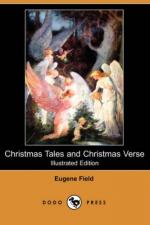“Much as I may yearn to have them, it cannot be,” she said to herself, “yet I may feast my eyes upon them.”
“Go away from here!” said a harsh voice. “How can the rich people see all my fine things if you stand before the window? Be off with you, you miserable little beggar!”
It was the shopkeeper, and he gave Barbara a savage box on the ear that sent her reeling into the deeper snowdrifts of the gutter.
Presently she came to a large house where there seemed to be much mirth and festivity. The shutters were thrown open, and through the windows Barbara could see a beautiful Christmas-tree in the centre of a spacious room—a beautiful Christmas-tree ablaze with red and green lights, and heavy with toys and stars and glass balls and other beautiful things that children love. There was a merry throng around the tree, and the children were smiling and gleeful, and all in that house seemed content and happy. Barbara heard them singing, and their song was about the prince who was to come on the morrow.
“This must be the house where the prince will stop,” thought Barbara. “How I would like to see his face and hear his voice!—yet what would he care for me, a ’miserable little beggar’?”
So Barbara crept on through the storm, shivering and disconsolate, yet thinking of the prince.
“Where are you going?” she asked of the wind as it overtook her.
“To the cathedral,” laughed the wind. “The great people are flocking there, and I will have a merry time amongst them, ha, ha, ha!”
And with laughter the wind whirled away and chased the snow toward the cathedral.
“It is there, then, that the prince will come,” thought Barbara. “It is a beautiful place, and the people will pay him homage there. Perhaps I shall see him if I go there.”
[Illustration: “This must be the house where the prince will stop,” thought Barbara.]
So she went to the cathedral. Many folk were there in their richest apparel, and the organ rolled out its grand music, and the people sang wondrous songs, and the priests made eloquent prayers; and the music, and the songs, and the prayers were all about the prince and his expected coming. The throng that swept in and out of the great edifice talked always of the prince, the prince, the prince, until Barbara really loved him very much, for all the gentle words she heard the people say of him.
“Please, can I go and sit inside?” inquired Barbara of the sexton.
“No!” said the sexton gruffly, for this was an important occasion with the sexton, and he had no idea of wasting words on a beggar child.
“But I will be very good and quiet,” pleaded Barbara. “Please may I not see the prince?”
“I have said no, and I mean it,” retorted the sexton. “What have you for the prince, or what cares the prince for you? Out with you, and don’t be blocking up the door-way!” So the sexton gave Barbara an angry push, and the child fell half-way down the icy steps of the cathedral. She began to cry. Some great people were entering the cathedral at the time, and they laughed to see her falling.




